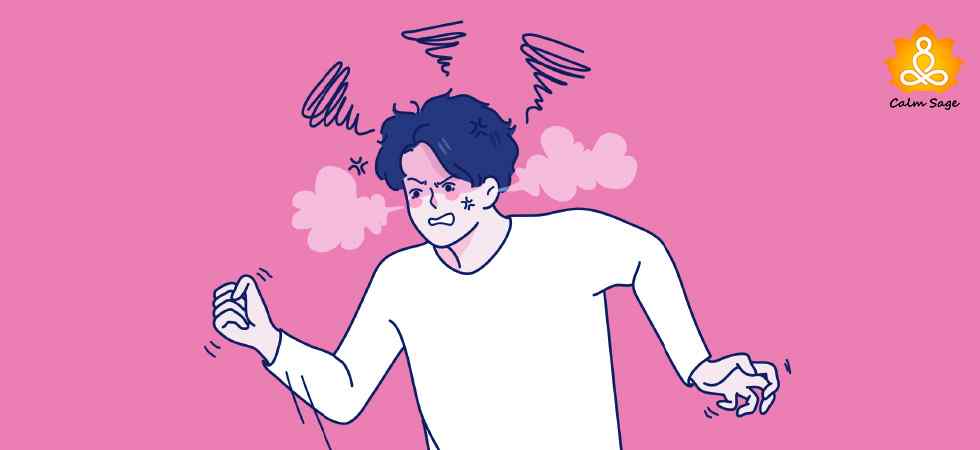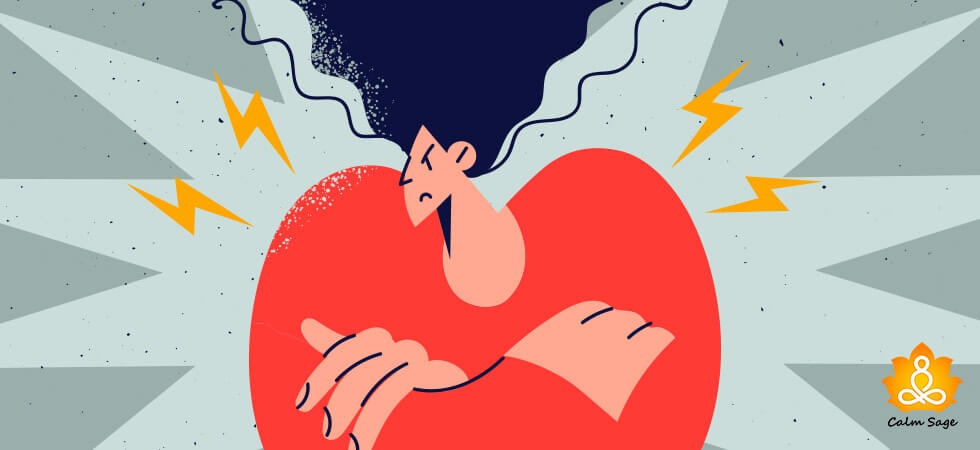Is Anger Addiction Real? Signs And Tips To Help You Out

“Anybody can become angry — that is easy” – Aristotle
Anger is an emotion that can be mentally, emotionally, and physically stimulating. Sometimes good, sometimes bad. But, when anger becomes your “go-to” emotion for any overwhelming situation, then it could be more than just an emotional expression. It could be “anger addiction”.
Righteous anger can help you release pent-up emotions, but in the wrong direction, it could be destructive, hurtful, and even threatening to you and others around you. This is the kind of anger you’d want to avoid.
Unfortunately, many people find themselves responding easily to anger, even knowing that their anger is destructive and troublesome.
Below, let’s understand what anger addiction is, whether it is a real diagnosis, what might cause someone to be addicted to anger, and how to take care of anger addiction.
Is Anger Addiction A Real Diagnosis?

Anger addiction is not an official diagnosis, but it’s still a real condition that can have distressing effects. In a 2016 study, it was found that the majority of people who experience intense levels of anger might be associated with conditions such as substance abuse, bipolar disorder, psychotic disorder, borderline personality disorder, or schizotypal personality disorder.
In any case, a mental health diagnosis is not always needed to determine anger issues in a person. A stressful job, an overwhelming lifestyle or any other day-to-day triggers can be responsible for anger issues.
If you’re wondering, “Am I addicted to anger?”, then here’s what I can say;
If you find yourself raging or getting angry frequently, then it’s OK to wonder if it’s an addiction. Addiction is defined as chronic. curable, and complex mix of genetics, environmental factors, lifestyle choices, and brain chemicals.
Addiction can be behavioral or substance-related. People who live with an addiction may engage in acts or use substances compulsively, despite their destructive consequences.
Anger might not be recognized in the DSM-5 as an addiction, but it can be a detrimental diagnostic criterion for conditions such as;
- Intermittent explosive disorder
- Disruptive mood dysregulation disorder
- Depressive disorders
- Oppositional defiant disorder
Anger Addiction Symptoms And Signs
Emotions make us human, they define our characteristics as well at times. Feeling emotions is healthy and the way we influence our emotional expression is called emotional regulation. When you know how to control emotional reactions, you’re better able to maintain your cool in overwhelming and distressing situations.
We all can have a difficult time controlling emotions, especially anger. And this becomes even more challenging when we’re taught from a young age that anger is a negative emotion and that we need to hide it. However, when you repress your anger, it can be unhealthy.
It can cause symptoms such as frequent anger outbursts, and not being able to manage our temper.
Here are some common anger addiction symptoms and signs that you should know about;
- Little things set your anger off. You get frustrated over small things
- You react physically and violently through screaming, yelling, etc
- You find yourself expressing remorse for your anger-filled actions
If this cycle continues, then it could be a major sign of anger addiction.
Why Can Someone Be Addicted To Anger?

Anger, no matter how explosive it can be, feels good. It gives you the “rush” you seek in distress. When you become addicted to anger, your brain seeks these little “rushes” where dopamine triggers the reward receptors in your brain, just like other addictions can such as gambling and doing drugs.
Then there’s the topic of ego and insecurity. The “thrill” behind anger can be triggered by hidden feelings of insecurity. It can be a way to take control of things you feel you’re losing control of. This is common in people with narcissistic personality disorder. Unluckily, the aftermath of this can have negative consequences that can hurt you and your ego. This begins a cycle of insecurity and anger.
There’s also another thing. For people who grow up in chaotic environments, where anger and volatile reactions are common ways to express emotions, anger can feel familiar. And comfortable even. It can help them distract themselves from uncomfortable feelings and experiences such as the fear of abandonment and loneliness. The rush of anger can feel familiar enough and creates an intimacy that people might feel comfortable embracing than darker emotions such as loneliness and grief.
How To Manage Anger Addiction?
Here’s how you can manage your anger addiction;
- Learn to relax: With practices like mindfulness for anger, deep breathing, and other relaxation techniques, you can learn to control your anger in heated or distressing situations.
- Focus on solving problems: If your anger is triggered, then it could be a problem. Something you can solve. Instead of focusing on the trigger, focus on solving it, so you’re safer from angry outbursts in the future.
- Change your communication style: Misunderstanding can also be one reason for your anger addiction. It’ll help if you try to change your communication style and reduce impulsive and angry responses.
- Avoid your anger triggers: Identify what triggers your anger in most situations and try to avoid them as much as you can. Some triggers might be hard to eliminate such as traffic (for road rage) but some, you can avoid. If you can’t avoid some triggers, then adopt relaxation techniques in your lifestyle.
- Try anger therapy: With a mental health professional’s help, you can learn how to identify your triggers and what you can do to cope with your addictive anger. They can also teach you healthy ways to manage your anger addiction.
What Next?
Anger is a common human reaction. Sometimes, it can be righteous, but other times it can be destructive and not so helpful. If you believe you’re addicted to anger, then there’s treatment available to help you out. With a professional’s help, you can learn how to control your addiction to anger and cope with the aftermath.
Anger addiction is not yet an official diagnosis, but it can still be connected to many mental health conditions. If you or someone you know are struggling with anger addiction, then there’s always support available.
Don’t hesitate to reach out to a professional counselor or online support groups for help. You can also connect with BetterHelp by clicking the link below for anger therapy.
I hope this article helped you understand anger addiction and why someone can be addicted to anger. For more, you can write to us at info@calmsage.comor DM us on social media.
You can also share your thoughts with us in the comments below.
Take Care!




















